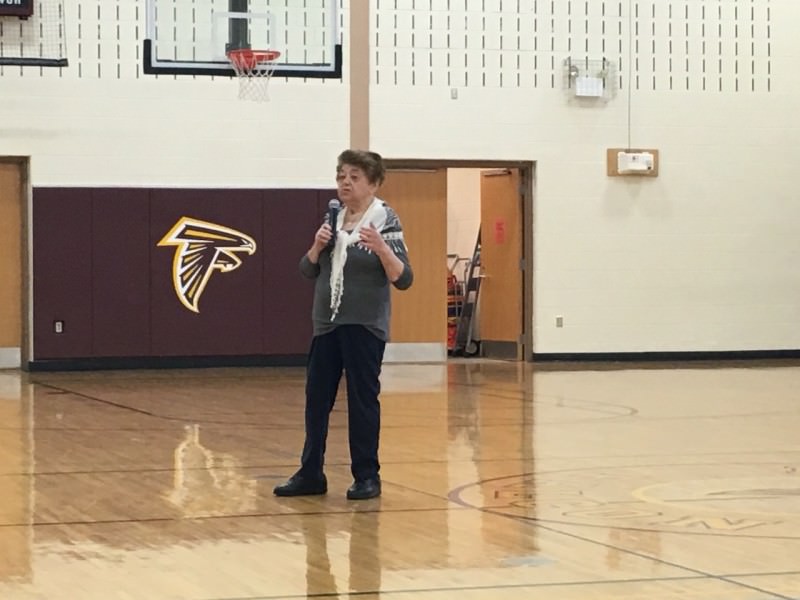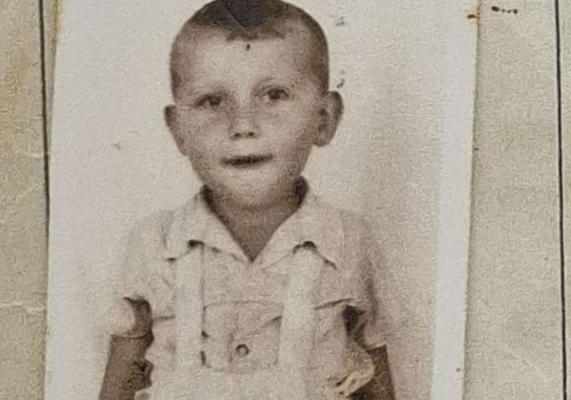


Photo 1: Magda Brown speaks to students at John F. Kennedy Middle School in Plainfield. Photo 2: Magda Brown posts for a photo. Photo 3: Brown answers questions from students.
PLAINFIELD, IL — If you were to meet 88-year-old Magda Brown just walking down the street, her tragic past would be almost inconceivable. She’s warm, funny, compassionate and personable. No part of her gives away that she is a Holocaust survivor. She’s not bitter or angry. Her faith in God has not been torn down.
Perhaps that’s because she feels she was no different than the eighth graders she spoke to Friday at John F. Kennedy Middle School in Plainfield. Brown was a normal teenage girl. She liked to do her hair, she liked nice things, she had her own room. She was just like teenagers today.
Brown was 16 when Nazis invaded her hometown of Miskolc in Hungary. Nazis who were welcomed in by the Hungarian police.
This was in 1944, when Hitler felt Hungary was not doing enough for his “final solution,” Brown said.
But the signs were there before that.
“Genocide does not happen from one minute to the next. It builds gradually,” Brown said.
Hungary had adopted laws from Germany, which hit the residents one by one, Brown said. Only one percent of Jewish children were allowed to attend middle school. Soon Jews received pink slips saying they were no longer allowed to work.
“In no time at all, the order comes that every Jewish person must wear the yellow Star of David on their clothing, even tiny children,” Brown said. “Without it, they were not permitted to go on the streets.”
It’s a symbol Brown still wears today, but as a necklace – a small, gold Star of David.
Soon after, all Jews were ordered from their home into a ghetto. They were allowed to pack provisions for three or four days.
Until this time, the Hungarian police had protected Brown and other Jews as they would any other Hungarian citizen. Now they looked the other way.
They had to turn in their cash, jewelry and radios. The cash went to Hungarian railroad workers who shipped the Jews to Auschwitz.
During this time, they were told one of the great “lies of the 20th century,” according to Brown.
“The families will stay together,” she said. “We obeyed. We didn’t resist with the hopes that the war will be over soon.”
After spending some time in a transition camp, Brown and her family were placed into a crowded boxcar where they would eventually arrive in Auschwitz-Birkenau. They spent three days on the train, where Brown stood so her parents could sit on the floor. They had one bucket to relieve themselves in and another bucket filled with water, which was not filled again during the trip.
“The only thing you can focus on is ‘If I could only have a sip of water,’” Brown said.
When they arrived, they were told to leave their belongings in the boxcar and they’d be able to get them later, but they never saw them again.
That was the last time Brown saw her parents, who were taken to the gas chambers.
Brown and the rest of the prisoners had to have their heads and body hair shaven. Disinfectant was then thrown onto their freshly-shaven skin.
Then there was the shower room with 15 shower heads, but barely a trickle of water.
She was given flip flops with wooden soles, a uniform that in no way fit her and then had to sleep in a unit with 500 other women, ”like sardines,” Brown said.
On average, her daily calorie intake was between 300 to 500 calories.
Brown spent spent two months in Auschwitz before she was sent to a work camp in Allendorf, Germany in August 1944. There she worked in a munitions factory where the poisonous chemicals turned their skin yellow, hair orange and lips deep, dark purple.
When it appeared the war was coming to an end, Brown said they were taken on a death march on an open highway. At night, they slept in ditches. During the day, they just walked.
On the third day, they reached a farm area and noticed there were fewer guards with them than before.
“A group of us were standing around this farmland and in the distance we noticed a barn,” Brown said.
During the night, they crawled on their stomachs toward the barn, not caring if they were killed since then it would at least be over.
“The next day, two beautiful GIs from the sixth armored division, God bless them all, they liberated us.”
When asked how she managed to get through it, she said she survived on faith and fantasy.
With a story like that, Brown would have the understanding of everyone in the world if she wanted to be bitter about her life. But she’s not. She has a mantra that she says every morning. She thanks God for waking up, having food to eat and a place to sleep. Everything else is just a bonus for her.
For more information on Magda Brown, visit her website.
Originally published HERE.








